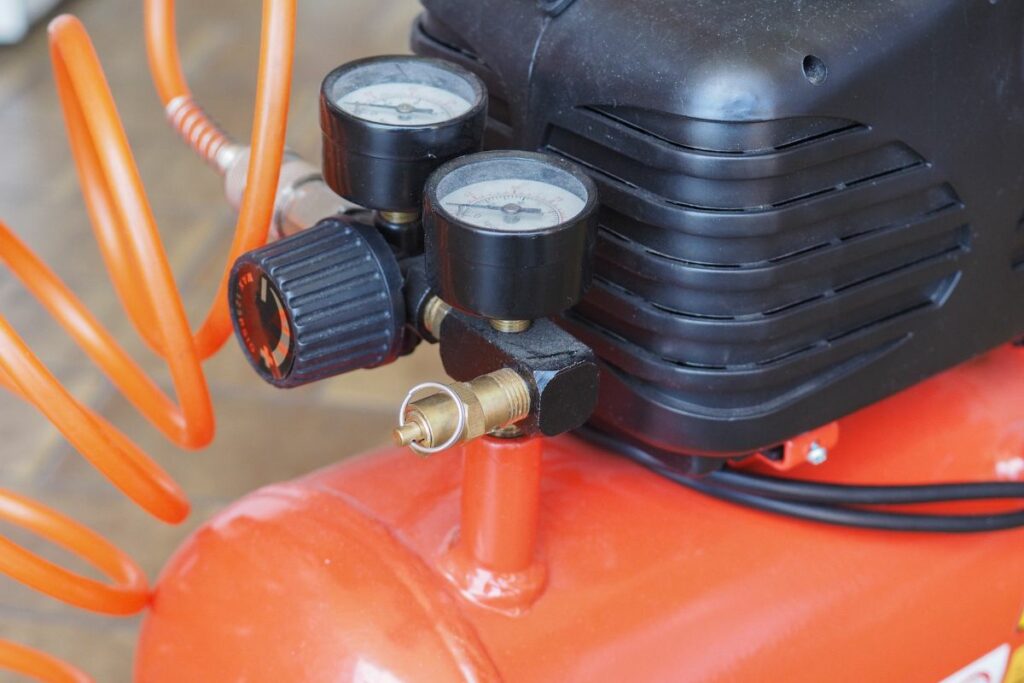*This post may contain affiliate links. As an Amazon Associate we earn from qualifying purchases.
Air compressors are mechanical devices that use energy to compress and store air in a tank, which can then be used to power a variety of tools and equipment. A compressor is commonly used in industries such as manufacturing, construction, and automotive repair, as it provides a reliable source of pressurized air that can be used to operate pneumatic tools and equipment.
One of the main advantages of a compressor is its versatility and ability to power a wide range of tools and equipment. However, there are also potential downsides to using a compressor.
For example, they can be noisy, which can be a nuisance for those working in close proximity or for those who live in residential areas. In addition, a compressor can be costly to purchase and maintain, with the need for regular oil changes, filter replacements, and other routine maintenance tasks.
Finally, a compressor can be large and heavy, which can be a challenge for those working in small or confined spaces.
Given these potential downsides, some businesses and individuals may be interested in exploring alternative options to traditional air compressors. In the next section of the article, we will explore some of the alternative options available and discuss the advantages and disadvantages of each.

Alternatives To A Traditional Air Compressor
There are several alternative options to traditional electric air compressors that businesses and individuals can consider, depending on their specific needs and preferences. Some of the most common alternatives include:
Compressed air storage tanks
These are large tanks that are used to store compressed air, which can then be used to power tools and equipment as needed. Advantages of using compressed air storage tanks include their energy saving properties (since they can store and release air as needed, rather than continuously running a compressor), as well as their reduced noise compared to traditional air compressors.
However, they can be expensive to purchase and install, and they require a significant amount of space for storage.
Vacuum pumps
These devices use mechanical or electrical energy to create a vacuum, which can be used to power a variety of tools and equipment. Vacuum pumps are often used in industries such as food processing, packaging, and medical device manufacturing.
Some advantages of vacuum pumps include their versatility and low maintenance requirements. However, they may not be suitable for certain applications that require high pressure or large volumes of air, and they can be expensive to purchase.
Pneumatic tools with built-in compressors
Some pneumatic tools, such as nail guns and staplers, come with built-in compressors that allow them to operate without the need for a separate compressor. Some advantages of these tools include their portability and ease of use, as they can be taken anywhere and used without the need for a power source or external air supply.
However, they may not be suitable for continuous use or for powering larger or more powerful tools, and they may not be as powerful as traditional air compressors.
Hydraulic systems
These systems use pressurized fluid to power a variety of tools and equipment. They are commonly used in industries such as construction and manufacturing and are known for their high power and versatility.
However, hydraulic systems can be complex to maintain, with the potential for leaks and other issues, and they may not be suitable for certain applications that require precise control or low pressure.
In the next section of the article, I will go into the advantages and disadvantages of each of these alternative options in more detail.
Advantages And Disadvantages Of Each Alternative
When talking about alternatives to air compressors it is important to consider their advantages and disadvantages as well. Obviously, if you are looking to get an alternative to a compressor you should think about all of the possible pros and cons of each option.
Compressed air storage tanks:
Advantages:
- Energy efficiency: Compressed air storage tanks allow businesses to store compressed air, which can then be used as needed, rather than continuously running a compressor. This can help to reduce energy consumption and costs.
- Reduced noise: Compressed air storage tanks are generally quieter than traditional air compressors, which can be a benefit for those working in close proximity or for those who live in residential areas.
- High capacity: Compressed air storage tanks can store large volumes of compressed air, which can be useful for businesses that require a large supply of pressurized air.
Disadvantages:
- Initial cost: Compressed air storage tanks can be expensive to purchase and install, with the need for additional piping and other equipment.
- Space requirements: Compressed air storage tanks can be large and require a significant amount of space for storage.
- Maintenance: Compressed air storage tanks require regular maintenance, including the need to refill the tanks and check for leaks.
Vacuum pumps:
Advantages:
- Versatility: Vacuum pumps can be used in a variety of applications, including food processing, packaging, and medical device manufacturing.
- Low maintenance: Vacuum pumps generally require less maintenance than traditional air compressors, with the need for fewer filter replacements and oil changes.
- Energy efficiency: Some types of vacuum pumps, such as regenerative blowers, are known for their energy efficiency.
Disadvantages:
- Limited capacity: Vacuum pumps may not be suitable for certain applications that require high pressure or large volumes of air.
- Cost: Vacuum pumps can be expensive to purchase, particularly high-capacity models.
- Suitability: Vacuum pumps may not be suitable for certain applications, such as those that require precise control or low pressure.
Pneumatic tools with built-in compressors:
Advantages:
- Portability: Pneumatic tools with built-in compressors can be taken anywhere and used without the need for a power source or external air supply.
- Ease of use: These tools are easy to operate and do not require the setup or maintenance of a separate compressor.
Disadvantages:
- Limited power: Pneumatic tools with built-in compressors may not be as powerful as traditional air compressors, and may not be suitable for continuous use or for powering larger or more powerful tools.
- Suitability: These tools may not be suitable for certain applications that require a high volume of air or precise control.
Hydraulic systems:
Advantages:
- High power: Hydraulic systems can provide high levels of power, making them suitable for a wide range of applications.
- Versatility: Hydraulic systems can be used to power a variety of tools and equipment, including those that require precise control or high pressure.
Disadvantages:
- Maintenance: Hydraulic systems can be complex to maintain, with the potential for leaks and other issues.
- Suitability: Hydraulic systems may not be suitable for certain applications that require low pressure or precise control.
In conclusion, each of the alternative options to traditional air compressors has its own advantages and disadvantages, and the right choice will depend on the specific needs and preferences of the business or individual. It is important to carefully research and compare different options before making a decision.
Final Thoughts
In conclusion, compressors are widely used in a variety of industries for their ability to provide a reliable source of pressurized air to power tools and equipment. However, there are also potential downsides to using air compressors, including their noise, cost, and maintenance requirements.
As a result, some businesses and individuals may be interested in exploring alternative options.
There are several alternatives to traditional compressors available, including compressed air storage tanks, vacuum pumps, pneumatic tools with built-in compressors, and hydraulic systems. Each of these options has its own advantages and disadvantages, and the right choice will depend on the specific needs and preferences of the business or individual.
When considering an alternative to a traditional compressor, it is important to carefully research and compare all of your different options. This can help to ensure that the chosen alternative is the best fit for the specific needs and preferences of the business or individual, and can help to minimize any potential downsides or challenges.
By considering the various alternatives available, businesses and individuals can find an option that meets their needs while minimizing any potential drawbacks of using traditional air compressors.
